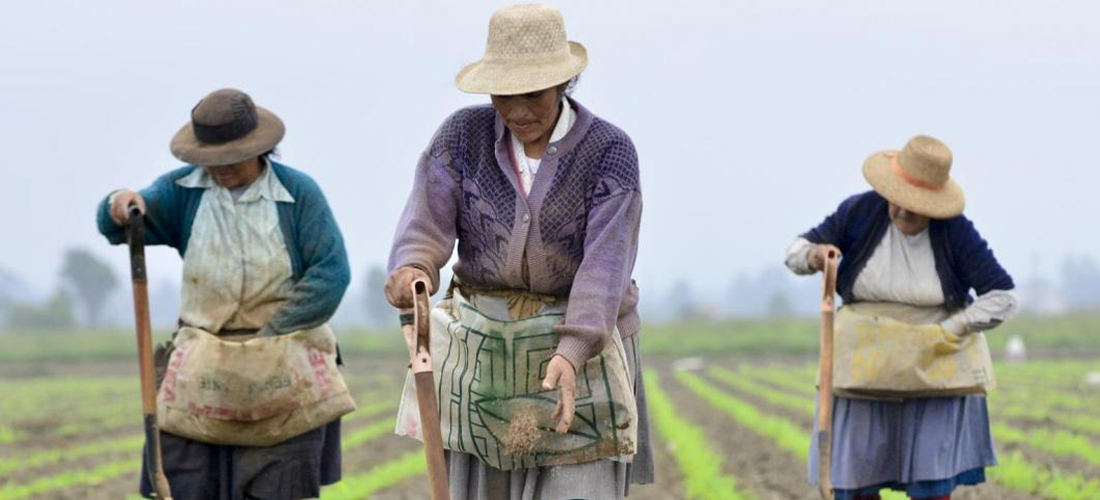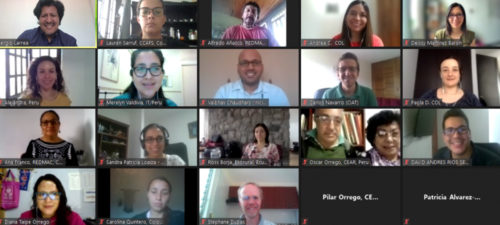A new research project in Colombia, Peru, and Ecuador will generate evidence on the contribution of agroecology to climate resilience and low-carbon emissions.
What is the future of food production? – is a question shared by various stakeholders in the world of agriculture. The challenges of climate change and variability, the use of pesticides and fertilizers, and the high environmental costs caused by the mismanagement of resources such as soil, water, and non-renewable energy have positioned agroecology as the path to resilience. Farmers, scientists, and decision-makers in Latin America are no strangers to this dynamic. The resilience of 10 million smallholder farmers faces challenges in the Andes and Central America, so strengthening agricultural systems based on agroecological practices is vital for the health of the planet and people, envisioning a sustainable future for our food systems.

In response to this urgent need, the CGIAR Research Program on Climate Change, Agriculture and Food Security (CCAFS), led by the Alliance of Bioversity International and the International Center for Tropical Agriculture (the Alliance), has joined the Andean Initiative of the International Potato Center (CIP), the French Agricultural Research Center for International Development (CIRAD), the French National Research Institute for Sustainable Development (IRD), the Red de Mercados Agroecológicos Campesinos del Valle del Cauca (REDMAC) in Colombia, the EkoRural Foundation in Ecuador, and the Centro de Apoyo Rural (CEAR) in Peru, to launch the project “Agroecology for Climate Action in Latin America: Strengthening the evidence base for a climate-resilient and low-carbon smallholder agriculture through agroecology”.
NEW HORIZONS FROM AGROECOLOGY IN LATIN AMERICA
In a recent virtual meeting between the institutions leading the project and the local partners, an enriching dialogue took place in which the latter shared their work in agroecology, challenges for its scaling up, and expectations about the scope they wish to achieve in each of the territories where their organizations intervene. The purpose of this project is to generate evidence on the contribution of agroecology to climate resilience and low-carbon emissions in small-scale family farming in the region.
For EkoRural in the central highlands of Ecuador, enriching its learning and work through collaboration with partner organizations in Colombia and Peru is one of the strengths of this project, in addition to the research components that the project will work on from an agroecological perspective for climate resilience.
CEAR, located in the central Andes of Peru, is committed to working together to promote the consumption of organic products through innovations such as mobile applications and e-commerce that allow access to differentiated markets. They also seek that the development of these digital technologies contribute to capacity building in young people and serve for decision-making based on agroclimatic information for adaptation and mitigation.
REDMAC, which brings together farming families from Colombia’s Valle del Cauca, emphasizes that agroecology is a livelihood option for both producer and consumer families, and hopes to show decision-makers that agroecology, in addition to helping address the challenges of climate change, is socioeconomically viable.

Bringing together smallholder farmers, consumer networks, local organizations, and scientists in Colombia, Ecuador, and Peru, this promising project will collect and systematize information on the contribution of agroecological practices to climate mitigation and resilience across farms and landscapes with heterogeneous profiles of smallholder family farming.
WHAT COMES NEXT?
Undoubtedly, agroecology goes hand in hand with nature and the dialogue of scientific and traditional knowledge to achieve inclusive and sustainable food systems. With this objective, project members will identify and analyze the agroecological practices that currently gather—or exclude—smallholder farming spaces in order to monitor, optimize and encourage them.
Specifically, the project will generate evidence on the extent to which the identified agroecological practices contribute to greenhouse gas (GHG) mitigation through carbon footprint measurements. It will also evaluate the socioeconomic viability of these practices in small family farming contexts in Latin America. The new digital tools—an important component of this project—will make it possible to articulate the information coming from the agroecological systems covered with broad networks of consumers and decision-makers in these institutional ecosystems, envisioning enabling policies for their necessary and urgent scaling up.
Blog by Lauren Sarruf is the Communications Officer for CCAFS Latin America. Alejandra Arce is an Associate Scientist at the International Potato Center (CIP).
